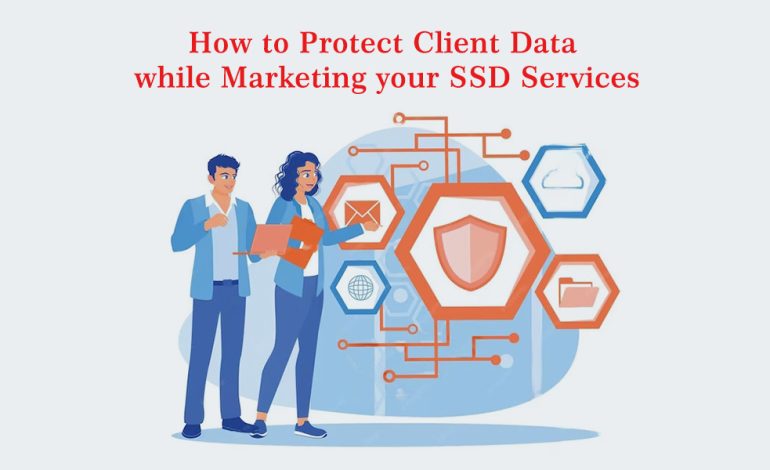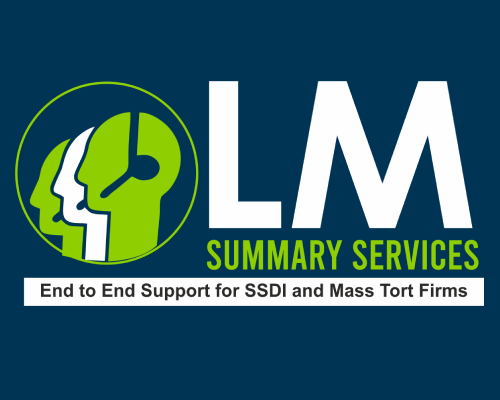Advertising for an SSD law firm is like walking in a minefield. Sure, you need effective and creative marketing strategies, but you also need to be careful when handling client information - whether via phone calls, texts, documents, or online form submissions. In the US, we have privacy laws that dictate to organizations how to collect, store, and use personal data.
SSD applicants, who are unable to work due to disabilities must go through a painstakingly long process to receive benefits, making legal representation essential. It’s also important to note that their chances of getting benefits are much higher if they have professional legal help. But to reach this audience, you must be transparent and protect their privacy. This includes communicating about data use, obtaining consent, and protecting their data.
In this article, we’ll go over some important data protection laws, outline best practices for client data security, and recommend ethical marketing strategies for digital marketing compliance. Drawing on our experience in starting and expanding an SSD law firm, DL Marketing now assists other SSD organizations with their marketing strategies.
Understanding the Legal Landscape

Marketing for SSD organizations and advocacy groups can be tricky due to the strict privacy and medical information protection laws in the United States. These regulations protect citizens from invasive marketing practices and unauthorized use of their personal information (name, address, age, and any other personally identifiable information or PII).
As a result, all communication - via social media, newsletters, webinars, web forms, and blog posts - must adhere to these legal requirements.
FCC
The Federal Communications Commission (FCC) is an independent U.S. government agency that oversees all forms of communications across various media. This includes telecommunications such as telephone services, internet communication, and wireless networks that allow for calls and texts.
TCPA
The Telephone Consumer Protection Act (TCPA), was established in 1991 and supervised by the FCC.
In December 2023, the FCC tightened TCPA Rules to protect consumers from unwanted communications. These updates specifically address two issues: they close the “lead generator” loophole, which allowed businesses to make unsolicited robocalls and send robotexts by widely sharing client data, and they implement new rules for blocking illegal texts.
For SSD law firms and advocacy groups, this means re-evaluating and potentially modifying their lead generation practices ensuring compliance. To avoid violations, you must comply with these requirements:
- Calling Time Restrictions: Calls can only be made between 8:00 AM and 9:00 PM in the recipient’s time zone.
- Internal Do Not Call (DNC) List: Firms must maintain a list of consumers who’ve requested not to be contacted.
- Consent for Autodialed Calls: Explicit prior consent is required for marketing calls or texts to cell phones using automated systems.
- Robocall Restrictions: Pre-recorded marketing calls to residential lines or cell phones are prohibited without prior express written consent.
- Identification: Marketers must identify themselves and provide contact information during each call.
Violations of the TCPA can be costly, with fines ranging up to $1,500 per willful violation, and the act allows consumers to file lawsuits, including class actions, for breaches. This, combined with the risk of contacting numbers that have been reassigned to different consumers, underscores the importance of compliance.
HIPAA
The Health Insurance Portability and Accountability Act (HIPAA) was enacted in 1996 to protect the privacy of individuals’ medical records. It protects individuals by telling healthcare providers and other organizations how to handle and share sensitive patient information.
Since SSD organizations deal with personal medical information when helping clients with disability claims, they need to be compliant with HIPAA. They need to ensure they don’t misuse this sensitive information in their marketing efforts.
For example, if an SSD law firm wants to send out a newsletter talking about their success in helping clients with specific medical conditions, they can't share any personal health information without consent. HIPAA violations range from $100 to over $60,000.
CCPA
Enacted in 2018, the California Consumer Privacy Act (CCPA) went into effect on January 1, 2020. It’s meant to protect Californians’ privacy rights and consumer interests. Under the CCPA, Californians have rights that affect how SSD law firms handle client data:
- The right to know what personal information is collected and its purpose.
- The right to delete personal information, with exceptions.
- The right to opt-out of the sale or sharing of their personal information.
- The right to correct inaccuracies in personal information.
- The right to limit the use of sensitive personal information.
Large SSD law firms, in particular, must comply with the CCPA while using personal and medical records for targeted marketing. They must put up clear privacy notices, respond quickly to requests from customers about their data, and use strong data security measures.
In case of a data breach, firms must have proper security measures in place to avoid liability. If personal information is stolen, firms may have to pay statutory damages. This shows how important cybersecurity is for keeping client data safe.
Best Practices in Client Data Security

SSD law firms and advocacy groups deal with highly sensitive data, like medical records. As such, there's an inherent risk that unauthorized individuals, such as hackers, will try to access, steal, or sell this data.
The possible legal ramifications are bad enough, but these breaches also endanger clients’ privacy and jeopardize trust between firms and clients. Integrating security into your marketing strategies shows your commitment to client privacy and data protection.
- Secure Data Storage and Transmission:
- Encryption: Encrypt your databases to convert client information into a code that only authorized users can decipher. So, even if someone gets their hands on the data, they won’t be able to read it without the right decryption key.
- Protocols: You can create a secure channel that keeps data from being looked at as it travels by using HTTPS for web interactions and TLS for email and data transmission.
- Avoid Data Silos: Avoid the problems that come with storing information on different, unprotected platforms by ensuring that client data is managed in one place. Having a unified data strategy makes things safer and easier to manage.
- Implement Cybersecurity Measures:
- A firewall is a network security device that checks all traffic to prevent unauthorized access.
- Anti-virus software identifies and eliminates threats that could compromise client data.
- Multi-factor authentication (MFA) adds a layer of security, requiring more than just a password to access accounts.
- Limit access to data: Not every piece of client information needs to be accessible to every team member. Put in place access controls that limit who can see data based on their job. This will lower the risk of internal and external data breaches.
- Regular Security Audits: Be proactive by conducting regular audits to identify and address new or overlooked vulnerabilities. This ensures that your security measures are always current and can effectively counteract new threats.
- Employee Training and Awareness: Create a data privacy culture within your organization by training employees on the importance of data security and introducing them to best practices. Everybody being on the lookout for possible breaches is the first line of protection.
- Consent and Transparency: Clearly state what data you’re collecting and why, using disclaimers or terms and conditions. Add checkboxes for users to actively opt-in, ensuring they understand and agree to these terms. Simplify opting out with visible unsubscribe links and easy-to-navigate website preference settings.
Developing a Data Breach Response Plan

While the point of preventative measures is to avoid data breaches, you still need to be prepared for the worst-case scenario. With a response plan in place, your staff will know immediately how to act. Here are some steps to take when you have a data breach according to the FTC:
1. Immediate Response and Securing Operations
When a breach is detected, act quickly to secure your systems and address the vulnerabilities that caused the breach. This includes securing the physical areas affected by the breach and changing access codes as needed. Get your breach response team together right away. It should include experts from IT, forensics, legal, and other relevant departments. This will stop any more data loss and start the recovery process.
2. Legal Obligations and Reporting
State laws regarding the notification of affected individuals may differ, but all of them stress the importance of quick communication for preventing identity theft. The breach should be reported to the right people, such as local police and, depending on the type of breach, the FBI or the U.S. Secret Service. Personalize responses based on the data involved to ensure compliance with specific regulations, like HIPAA for healthcare information.
3. Guidelines for Effective Communication
You must be honest with clients and stakeholders. Communicate what kind of breach it is, what information was lost, and what is being done to fix the problem. Offer assistance to affected individuals, such as credit monitoring services if financial information was compromised, and provide regular updates on the breach resolution process.
4. Mitigating Impact
To determine the extent of the breach and address any vulnerabilities, your team should do a thorough investigation. Review and restrict access permissions as needed to ensure that data is only available to those who need it. Remove any compromised information from your website and the wider web, and contact search engines to prevent sensitive data from being cached. Finally, check the security measures of any involved third-party vendors to avoid future breaches.
Ethical Marketing Strategies

SSD organizations deal with sensitive information for their marketing efforts. This leaves marketers with the difficult task of coming up with strategies that reach their intended audience while staying compliant.
Focus on Creating Valuable Content
Position your company as an authority in the SSD community by creating content that directly addresses the needs and concerns of your target audience. Informative blog posts, videos, and infographics naturally attract potential clients, reducing the need to rely on personal information for marketing outreach.
Participate in the Community
Deepen your connection with the SSD community through active participation. Hosting webinars, participating in community events, or forming partnerships with advocacy groups shows your commitment and expertise in a way that respects privacy and builds trust.
Monitor Website Engagement
By using analytics tools, SSD organizations can gain insights into visitor behaviors - what pages they visit, how long they stay, and their journey through your site. This information, while anonymized, is necessary to understand what your audience wants, allowing you to adjust your offerings and content more effectively.
Adapt to Platform-Specific Best Practices
SSD law firms can connect with their target audience through a variety of digital channels, such as SEO, social media, and paid advertising. However, each has its own set of rules in place to protect user privacy and ensure a safe environment. To use these channels ethically, you need to know how they are regulated.
Digital Marketing Compliance

Developing digital marketing strategies that adhere to the rules of each platform can be quite challenging. The best course of action is to staff your team with platform specialists who are well-versed in the rules and guidelines of each.
Paid Ads
Paid advertising involves purchasing ad space on platforms like Google (Google Ads and Youtube) and Meta (Facebook and Instagram) to target specific audiences. These ads can appear in search results, on social media feeds, or on partner websites.
To be in line with Google and Meta, you have to know and agree to their rules about advertising. Common terms include prohibitions against misleading content, privacy concerns, and restrictions on specific types of content. Since these platforms’ ad policies are subject to change in response to new legislation and cultural standards, they must be checked often.
Email Marketing
Email marketing is a strategy that involves sending emails to subscribers to inform, engage, or encourage purchases.
Consent is very important, and platforms like Mailchimp make it clear that emails should only be sent to people who have agreed to receive them. These platforms also prioritize transparency and ethical data collection, avoiding user lists that have been purchased, rented, or obtained from a third party.
These rules are similar to best practices for email marketing in general: make sure you have permission, don’t use misleading tactics, and make it easy for people to unsubscribe from your list.
Social Media
Social media platforms like Facebook, Twitter, Instagram, and LinkedIn each have their own set of community guidelines and advertising policies. These guidelines generally cover what is and isn't allowed in terms of content, interactions, and promotions.
- Facebook and Instagram: For example, both platforms, part of Meta, prohibit content that incites violence, contains hate speech, or promotes misinformation. Their advertising policies additionally restrict the promotion of certain products, such as alcohol, adult services, and gambling. When posting content or ads, ensuring that images and language do not violate these broad guidelines is crucial.
- Twitter: This platform is known for its emphasis on the freedom of expression but draws the line at direct threats of violence, harassment, and hate speech. In terms of advertising, Twitter has specific rules around political content, financial services, and health-related ads, demanding transparency and integrity.
- LinkedIn: Given its professional nature, LinkedIn’s community guidelines focus on maintaining a respectful and professional discourse. Overly promotional content that doesn't add value can be restricted.
Search Engines
Optimizing content for search engines, primarily through SEO, means using keywords, creating high-quality content, and ensuring your website is easily navigable. Staying compliant means adhering to guidelines set by search engines like Google, which discourage manipulative practices (like keyword stuffing or cloaking) and prioritize user-friendly, informative content.
Content Marketing
The cornerstone of content marketing is trust. Ensuring your content is accurate, free from false promises, and clearly marked when sponsored helps build credibility with your audience. Best practices include thorough fact-checking, transparency about commercial relationships, and avoiding misleading headlines or information.
Partner with DL Marketing for Compliant and Effective Marketing

In this guide, important privacy laws for SSD organizations were outlined, along with best practices for keeping client data safe and responding to data breaches. We also looked at ethical marketing strategies while stressing the need for compliance across all digital marketing channels. We must clearly maintain transparency with clients, from how services are promoted to how their information is handled and shared.
Legal representation for SSD applicants greatly improves their chances of success. However, innovating within the boundaries of strict legal requirements is a unique challenge for SSD marketing professionals. In the end, the effectiveness of your marketing efforts has a direct impact on your company’s ability to acquire and retain clients. Compliance with data privacy also protects against the risk of legal action and financial penalties. Do you need assistance creating marketing campaigns that adhere to best practices? DL Marketing is here to help. Contact us for strategies that hit the mark, keep you compliant, and protect your clients all at once.





 Home
Home